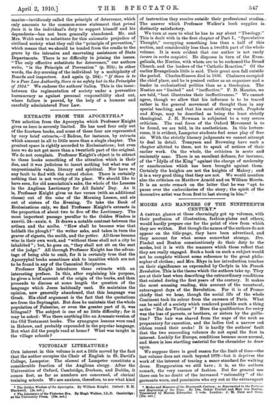EXTRACTS FROM THE APOCRYPHA.* THE selection from the Apocrypha which
Professor Knight gives us here is severely limited. He has used four only out of the fourteen books, and some of these four are represented by very brief extraets,-2 Maras, for instance, by extracts which amount in all to little more than a single chapter. The greatest space is rightly accorded to Ecelesiasticus; but even here we do not get more than a twentieth part of the original. We do not complain. Professor Knight's object is to attract to these books something of the attention which is their due, and it was judicious to insert nothing but what was of unquestionable value, literary and spiritual. Nor have we any fault to find with the actual choice. There is certainly nothing that is not worthy of its place. We should like to have seen, for old association's sake, the whole of the Lessons in the Anglican Lectionary for All Sainte' Day. As it is, Professor Knight gives us two verses (with an additional clause) out of the nine of the Morning Lesson, and sin out of sixteen of the Evening. To take the Book of Ecelesiasticua only, we find Professor Knight's extracts in the proportion of about two to five of the Lectionary. The most important passage peculiar to the Golden Wisdom. is
24—xxxix. 4. It draws a notable contrast between the artisan and the scribe. "How shall he become wise that holdeth the plough ? " the writer asks, and takes in turn the graver of signets, the smith, and the potter. All these become wise in their own work, and "without these shall not a city be inhabited " ; but, he goes on, "they shall not sit on the seat of the judge." All through Professor Knight has the advan- tage of being able to omit, for it is certainly true that the Apocryphal books sometimes sink to inanities which are not to be found in any of the Canonical Scriptures.
Professor Knight introduces these extracts with an interesting preface. In this, after explaining his purpose, he gives a brief account of the origin of the books, and then proceeds to discuss at some length the question of the language which Jesus habitually used. He maintains the opinion, now generally abandoned, that this language was Greek. His chief argument is the fact that the quotations are from the Septuagint. But does he maintain that the whole population of Palestine, or even the greater part of it, was bilingual? The subject is one of no little difficulty; for it may be asked: Was there anything like an Aramaic version of the Old Testament books. The synagogue lessons were read in Hebrew, and probably expounded in the popular language. But what did the people read at home P What was taught in the village schools ?










































 Previous page
Previous page